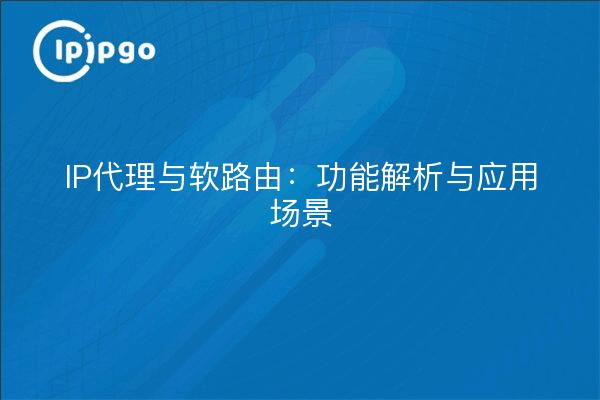
In the modern network world, both individual users and enterprises need tools to optimize network performance and improve security. ip proxy and soft routing are two common and important tools. Although they overlap in some of their functions, they also have unique advantages and application scenarios. In this article, we will analyze the concepts, differences, and practical applications of IP Proxy and Soft Routing.
1. What is an IP Proxy?
IP proxy is a technology that hides a user's real IP address through a proxy server. The user's network request passes through the proxy server first, and then the proxy server forwards to the target server, thus realizing the hiding and replacing of the IP address.IP proxy can be divided into various types, such as HTTP proxy, HTTPS proxy, SOCKS proxy and so on.
IP Proxy is like a middleman that helps us to hide our real identity in the online world, thus enabling anonymous access and IP replacement. Whether it's data crawling, network security, or improving access speed, IP proxies can be of great help.
2. What is soft routing?
Soft Router (Soft Router) is a device that realizes the function of a router by installing a router operating system or routing software using an ordinary computer or embedded device. Unlike traditional hardware routers, Soft Router has higher flexibility and scalability, and can install various plug-ins and function modules as needed.
Soft routing is like a multi-functional network management device that can be customized and configured according to user needs for more efficient network management and optimization.
3. Differences between IP proxies and soft routes
Although IP proxies and soft routes overlap in some of their functions, they differ significantly in their implementation and application scenarios.
- Realization approach:IP proxies are used to hide and change IP addresses through proxy servers, while soft routing is used to realize router functions by installing a router operating system or routing software.
- Application Scenarios:IP proxies are better suited for scenarios such as data capture, network security and improving access speeds, while soft routes are better suited for home network management, enterprise network optimization and multi-functional network devices.
- Flexibility:IP Proxy mainly provides the function of IP hiding and replacing, while Soft Route can install various plug-ins and function modules as needed, which has higher flexibility and scalability.
4. IP proxy application scenarios
IP proxies have a wide range of applications in the following scenarios:
- Data Grabbing:In the big data industry, data crawling is a very important part. IP Proxy can bypass the IP restriction of websites by hiding the real IP address, thus realizing efficient data crawling.
- Cybersecurity:IP proxies can help users hide their real IP addresses, improve network security, and prevent hacking and information leakage.
- Improve access speed:IP proxies can improve access speeds through load balancing and intelligent routing to ensure efficient data processing.
- Geolocation switching:IP proxies can help users realize flexible switching of geographic locations, so as to obtain data from different regions for market research and user behavior analysis.
5. Application scenarios for soft routing
Soft routing has a wide range of applications in the following scenarios:
- Home network management:Soft router can realize intelligent management of home network by installing various plug-ins and function modules, such as bandwidth control, parental control, advertisement filtering and so on.
- Enterprise network optimization:Soft routing can help enterprises achieve network optimization and management, such as load balancing, firewall settings, etc., so as to improve the stability and security of the enterprise network.
- Multi-functional network equipment:Soft routes can be customized and configured according to user needs, installing various plug-ins and functional modules to achieve the needs of multi-functional network devices, such as NAS (Network Attached Storage), download servers, and so on.
summarize
IP Proxy and Soft Routing are both very useful network tools, each with unique advantages and application scenarios. IP Proxy is suitable for data capture, network security and access speed enhancement scenarios, while Soft Routing is more suitable for home network management, enterprise network optimization and multifunctional network equipment needs. By utilizing IP Proxy and Soft Routing appropriately, we can perform network operations more efficiently and improve work efficiency and security.
Whether you are an individual user or an enterprise, you can choose the right tool according to your needs, fully utilize the advantages of IP proxy and soft routing, and enhance the effectiveness of network operation.








